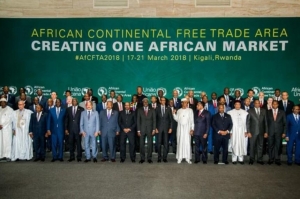2022 Africa CEO Trade Survey – what does the AfCFTA mean for African business
The Pan-African Private Sector Trade and Investment Committee (PAFTRAC) has announced today the launch of the 2nd edition of its Africa CEO Trade Survey. The focus this year will be on the opportunities being created by the African Continental Free Trade Area (AfCFTA) Agreement.
The AfCFTA agreement creates the largest free trade area in the world, by the number of countries participating and under which trading commenced in January 2021. To ensure the success of the AfCFTA it is crucial that the private sector's voice be heard. The Africa CEO Trade Survey is an initiative by PAFTRAC that provides the continent’s private sector with a platform to express their sentiments on localized and pan-African trade policies. The survey results are presented in a report format that seeks to advocate private sector views to inform policy reform and shape the future of African trade.
“The opportunity that the AfCFTA brings to businesses across the continent is enormous, that is why we must get the implementation right. The private sector wants and needs to be an ally in this process.” said Prof Patrick Utomi, Chairperson of PAFTRAC, commenting on the launch of the Africa CEO Trade Survey. “We call on business leaders from across the continent to make your voices heard by participating in this survey.”
Last year’s survey spanned 46 countries and welcomed responses from over 400 African CEOs.

“When we find researches/opinions from other publishers that might interest you, we pass them along. Below you'll find the latest opinions on “Inequality can undermine successful African trade pact” by Sifisio Ndaba. Their opinions may differ from what you read in CFTA.Now. This article first appeared in the Independent Online.
The African Continental Free Trade Area (AfCFTA) is seen by many as a panacea for boosting intra-continental trade. However, others have raised reservations about the purported benefits of AfCFTA owing to the high levels of inequality that exist between the member states.
According to the International Trade Centre, AfCFTA is the largest free trade area by membership. It will connect 1.3 billion people across the 55 African countries. AfCFTA will provide businesses operating in the member states with new markets for their products and services.
The main tenet of the free trade agreement is that goods can be moved without imposing tariffs, to introduce competition, increase efficiency in the production of goods, and lower the price of goods and services for consumers in these countries. The African economy has largely been about primary commodities. The formation of AfCFTA is
aimed at helping African countries to diversify their products and increase economic growth. Moreover, AfCFTA will boost Africa’s revenue by $450 billion (about R6.7 trillion) and increase exports by $560bn, thus lifting 30 million people out of poverty.
However, the success of AfCFTA is predicated on the successful implementation of policy reforms. These measures include reduction of red tape, harmonising custom procedures and investment in infrastructure that will link the continent. The aim of reforming and harmonising trade will also lead to the integration of the continent into the global supply chain.
Like any other trade agreement in the world, AfCFTA will have “casualties”. While there are benefits for member countries as a result of the free movement of goods, the direct competition will result in the closure of many businesses in competition with bigger, established firms, as a result of the inequality that exists on the continent. AfCFTA member states have a high level of income inequality, with South Africa, Egypt and Nigeria alone contributing 50% of Africa’s GDP.
As a result of the above, the powerful business interest groups in some member states are likely to resist the implementation of the agreement, fearing competition from the relatively developed members like South Africa, Nigeria, and Egypt. Some of the members of these interest groups are funding governing parties of the member states and they can potentially sway the politicians not to implement this agreement.
Source : https://www.engineeringnews.co.za
Date Of Post : 6TH APRIL 2022


